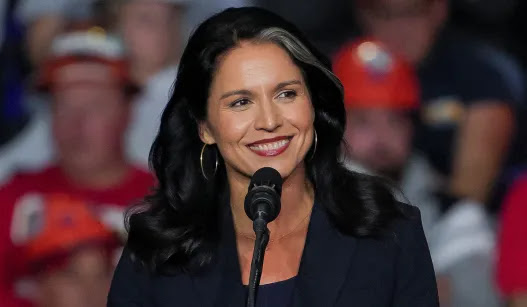President-elect Donald Trump has announced that Tulsi Gabbard, the former U.S. Representative from Hawaii, will be his pick for Director of National Intelligence (DNI). The selection, made public on Wednesday, marks a significant move as Gabbard, who served in the U.S. Army National Guard and gained national prominence for her anti-interventionist stance, joins Trump’s administration as one of his key intelligence advisors.
In a statement, President-elect Trump praised Gabbard’s career, stating, "For over two decades, Tulsi has fought for our country and the freedoms of all Americans. As a former candidate for the Democrat presidential nomination, she has broad support in both parties – and now, she is a proud Republican." Trump went on to emphasize Gabbard’s unique qualifications, citing her experience and dedication to the nation’s security. "I know Tulsi will bring the fearless spirit that has defined her illustrious career to our Intelligence Community, championing our Constitutional Rights, and securing Peace through Strength," he added.
Gabbard, who represented Hawaii’s 2nd congressional district for over a decade, made national headlines in 2020 when she ran for the Democratic presidential nomination. While she did not secure the party’s nomination, her campaign attracted significant attention due to her strong stance on non-interventionism and skepticism of U.S. military involvement abroad.
In 2022, Gabbard made waves again when she announced that she was leaving the Democratic Party, citing her opposition to what she described as the "elitist cabal of warmongers" within the party and its increasing focus on divisive identity politics. Gabbard’s break with the Democratic Party was accompanied by a scathing critique of its leadership, and she positioned herself as an advocate for conservative and libertarian values. "I can no longer remain in today’s Democratic Party," she posted on X (formerly Twitter), "which is now under the complete control of an elitist cabal of warmongers driven by cowardly wokeness…"
Her defection from the Democratic Party drew both support and criticism. Some viewed her decision as a principled stand, while others raised concerns about her shifting political alliances. Hillary Clinton, in a widely discussed remark, had previously suggested that Gabbard was being "groomed" by Russia to run as a third-party candidate during the 2020 presidential race, a claim that Gabbard denied.
Since leaving the Democratic Party, Gabbard has become a vocal critic of what she terms the “deep state” and censorship. She has advocated for a more restrained foreign policy, calling for reduced U.S. military involvement overseas and an emphasis on diplomacy. In recent months, Gabbard has aligned herself more closely with Trump, even endorsing him in late August 2024. "Trump understands the grave responsibility that a president and commander in chief bears for every single one of our lives," Gabbard said at the time. She also praised Trump’s willingness to engage with adversaries and his emphasis on peace through negotiation.
Gabbard’s appointment as DNI is seen by many as a reflection of Trump’s continued push for reshaping the U.S. intelligence community and foreign policy. As Director of National Intelligence, Gabbard will be responsible for overseeing the nation’s 18 intelligence agencies, coordinating efforts to safeguard national security, and providing the president with timely and accurate intelligence.
In early September, Gabbard also served as an advisor to Trump ahead of his debate with Vice President Kamala Harris. Gabbard, who had previously faced off against Harris in the 2020 Democratic primary debates, was seen as a strategic asset in preparing Trump for his confrontation with the current vice president.
While her appointment is bound to stir controversy, especially among those who remember her controversial departure from the Democratic Party, Gabbard’s supporters argue that her fresh perspective and military experience make her a strong candidate to lead the nation’s intelligence community in a rapidly evolving global landscape.










.png)

